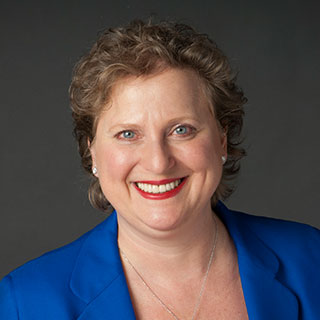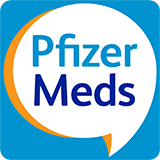Patients at the Center
People today are able to access and exchange more information than ever before, and it's no surprise that health is an area where information-sharing is exploding. As patients become more informed, they become more involved — more active in their own care and the care of others, and in medical research.
This is the era of patient-centricity,
where patients are far from passive subjects of study or treatment. Laypeople are taking starring roles
in designing clinical trials; tracking and managing their personal health data; and, crowdsourcing new insights and solutions with diverse, far-reaching
communities.
What does patient-centricity
mean for Pfizer? We're sharing information with patients in ways that are more relevant for them — and importantly,
we're also listening to them and working to act on what we hear,
answers Roslyn Schneider, M.D., Pfizer's Global Patient Affairs lead.

Roslyn (Roz) F. Schneider
Senior Director
Global Patient Affairs |
Pfizer has always been 'patient-centric' in the sense of operating with patients as the heart of our focus, but now more often we're offering patients a seat at the table — literally. |
KIDS (Kids and Families Impacting Disease through Science)
The KIDS (Kids and Families Impacting Disease through Science) program invites children, adolescents and families into the research process by allowing them to serve as an advisory group to improve clinical studies for children and areas where more research is needed. KIDS, a collaboration between the American Academy of Pediatrics, children's hospitals, local schools and other partners, including Pfizer, was piloted in 2013 in Connecticut and is expanding to other U.S. locations and abroad. Projects have included input on pediatric assent, feedback to industry researchers and formulators, collaboration with undergraduate research students, and attendance at international pediatric conferences.

Members of the KIDS Connecticut team at the Pediatric Academic Societies Meeting in Vancouver in May 2014
Pfizer Meds App
The Pfizer Meds app is designed to provide quick access to information for patients taking Pfizer prescription medicines. By simply scanning or entering the barcode on their prescription medicine pack, patients can access helpful, up-to-date information about their medicine and/or their medical condition. Launched in Australia and with pilots underway to expand this platform around the world, the app is available for free download in Australia from iTunes or Google Play.
Sickle Cell Disease Clinical Trial Recruitment
Sickle cell disease is a devastating illness marked by excruciating pain crises.
Studying the disease in patients often
means intercepting them at the worst of times, in emergency rooms — a big reason why sickle cell clinical trials have often been hobbled by
low recruitment and retention rates. To tackle this problem, Pfizer partnered with a health care ethnography firm to shadow
sickle cell
patients in their homes and other places throughout their day to gather real-life insights. We learned more about these patients' concerns
and their strengths, what motivates them to volunteer for clinical trials, and what practices work — and do not work — for recruiting sickle cell
clinical trial volunteers. These insights are being used to update Pfizer's approach to sickle cell patient clinical trial recruitment.
We need to show patients that we understand their point of view, and to explain better how to consider if a clinical trial
may be right for them.
— Krupa Sivamurthy, M.D.,
Medical Director, Sickle Cell Disease
Empowering Patients
Pfizer continues to engage with patients, caregivers and the health care community through the public outreach of Chief Medical Officer, Freda Lewis-Hall, M.D. and the Pfizer Medical and research organizations. Dr. Lewis-Hall's appearances on television shows such as Dr. Phil and The Doctors, together with Pfizer medical information offered on the Get Healthy, Stay Healthy website, GetOld.com and social media, connect U.S. audiences with medical expertise, resources and useful tools to help them manage their own and their families' health.
Chief Medical Officer, Freda Lewis-Hall, M.D., appeared on The Doctors segment, Breast Cancer — What You May Not Know But Should
in broadcast media
online




